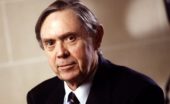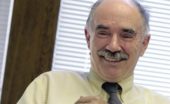Molly Minturn - My family is heartbroken to share that my father died in surgery on Monday, Feb. 10. It…
John Fortune R.I.P.
Written by Diana Thebaud Nicholson // January 28, 2014 // Arts and culture // Comments Off on John Fortune R.I.P.
The labyrinthine implications of the banking crisis, or the specific agonies of the international mortgage lending scandal absorbed within it, or the building of the £34bn Eurofighter to confront a Soviet Union that no longer exists in a war that nobody will start, skewered the absurdities of our capitalist culture better than any leader-writing commentator or opinion-monger.
We have lost one of the great satirists of our times. His brilliant exchanges with John Bird were devastating critiques of the perpetrators of the financial woes of the early 21st century. Among our favorites:
Bird and Fortune – Subprime Crisis
Bird & Fortune – Admiral Sir George Par (which sounds like Canadian Defense policy)
Bird and Fortune: George Parr, Army General
John Fortune: five great comedy sketches
(The Guardian) The comedian John Fortune was well-known for his satirical sketches. Here are five of the best, covering everything from defence policy to Twitter
John Fortune: Bremner and Sergeant pay tribute
(BBC) John Fortune, the comedian and satirist famous for his long TV partnership with John Bird, has died aged 74.
Here comedian Rory Bremner, who had worked with him since the 1990s, and political journalist John Sergeant, who worked with him in the 1960s, pay tribute to their friend and colleague.
John Fortune obituary
Comedian and actor best known for the satirical television show Bremner, Bird and Fortune
(The Guardian) John Fortune, who has died aged 74 after a long illness, was a distinguished member of the Oxbridge generation of brainy comedians who turned British entertainment inside out in the early 1960s, along with his friend, college contemporary and writing partner, John Bird, as well as Peter Cook, Jonathan Miller, Alan Bennett, David Frost, Eleanor Bron and John Wells.
From his earliest days on Ned Sherrin‘s Not So Much a Programme, More a Way of Life, the successor in 1964-65 to the satirical television magazine That Was the Week That Was, through to the comedy shows with Rory Bremner in the 1990s and beyond, he was a fixture of barely surprised indifference, with a wonderful line in deflationary, logical understatement. Tall and gangly, with a warm and ready smile but a performance default mode of aghast, beady-eyed and sharp inquiry, he seemed to make his points almost by accident; especially so when quizzing Bird’s brilliantly evasive all-purpose civil servant, think-tank person or fat-cat businessman, Sir George Parr, in their improvised sketches on the state of politics and the economy.
These hilarious and deadly duologues appeared first in 1992 on Rory Bremner’s show on BBC. In 1993 the trio moved to Channel 4, and then Bird and Fortune had their own series, The Long Johns (1995-97). The three joined forces again in Bremner, Bird and Fortune from 1999 onwards, the last full series coming in 2008.
The labyrinthine implications of the banking crisis, or the specific agonies of the international mortgage lending scandal absorbed within it, or the building of the £34bn Eurofighter to confront a Soviet Union that no longer exists in a war that nobody will start, skewered the absurdities of our capitalist culture better than any leader-writing commentator or opinion-monger.
While Bird blustered, Fortune faltered reasonably and unerringly to the obvious conclusions and a position of unassailable moral and intellectual probity. And he could do the same by adopting the opposite stance of a hopeless defender of the indefensible. His funniest “face” was one of amazed, “Go on, I can believe this only too well,” deadpan as the evidence piled up and the audience were in stitches. “The wonderful thing about our defence policy,” he said, “is that you only have to say what it is and everyone just laughs.” And then he would shake his head and burst out laughing himself, mouth as thin as a razor and, as the critic John Walsh once said, a spectacular cocked eyebrow that made him look like an astonished pigeon.
Fortune was the son of Hubert William George Wood, a commercial traveller, and his wife Edna Maude Fortune. He was educated at the cathedral school in Bristol and King’s College, Cambridge, where he read English (as did Bird), attended lectures by FR Leavis and performed in, and wrote, revues with Cook and Bron in the Footlights.
On graduating, he thought of working in adult education, but decided to help Cook open his Establishment Club in Soho instead. From 1961, he worked there, and then in the theatre and television for more than 50 years. He appeared in Alan Bennett’s On the Margin sketch show in 1966 and in the same author’s Forty Years On when it was revived much later on.
With Wells he wrote an outrageous comic novel, A Melon for Ecstasy (1971, its title derived from an old Turkish proverb, “A woman for duty, a boy for pleasure, but a melon for ecstasy”), and transformed his student-days friendship with Bird into a 1976 BBC sitcom, Well Anyway, in which the pair fetched up in a scruffy Earl’s Court flat and discovered they didn’t like each other, but that everyone else disliked them both even more. He and Bird appeared as the poet and the painter in Miller’s 1981 BBC television version of Timon of Athens, starring Jonathan Pryce, but a theatrical tour in Frederick Lonsdale’s On Approval constituted, for him at least, 11 weeks of misery. He was much happier when, in 2000, he joined Warren Mitchell and Ken Campbell in the 17th take-over cast of Yasmina Reza’s Art, in which he played, gloriously deadpan, a dermatologist who has bought a blank white canvas for 200,000 francs.
He popped up in two Nigel Cole films, Saving Grace (2000) and the triumphant Calendar Girls (2003), and played John the chauffeur in Woody Allen’s Match Point (2005). But he will be remembered best for his upright resistance to the hollow rhetoric and flim-flam in our public life, as when asked: while suffering a cardiac arrest, what is the first thing you need when you get to the hospital? “That’s right, a parking space.”
He described his hobby in Who’s Who as “lounging about” and collected antique ethnic textiles as well as political gaffes and banalities. He is survived by his second wife, Emma Burge, whom he married in 1995, and her son, Joseph; by a son, Emil, with his former partner Deborah Norton; and by a son, Thomas, daughter, Hannah, and stepson, Cameron, from his first marriage, to Susannah Waldo, which ended in divorce.
John Fortune, satirist and comedian, born 30 June 1939; died 31 December 2013
• This article was amended on 2 January 2014. The original stated that John Fortune was survived by a son and daughter by his first marriage, and a son by his second. This has been corrected.


